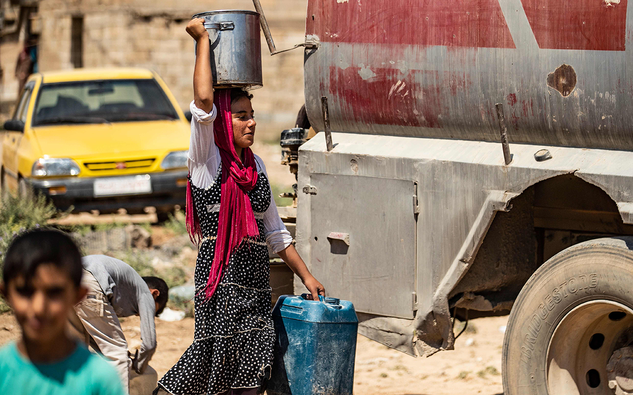A girl carries water from cisterns provided by aid groups during a water cutoff in Hasakah in northeast Syria, August 22, 2020 (AFP)
The water crisis in northeast Syria is worsening with the falling level of a key reservoir on the Euphrates River, threatening supplies, provision of electricity, and irrigation.
Syria Direct reports that the level in the al-Assad Lake, in western Raqqa Province, is at its lowest point since 2013. The reservoir was at 298.83 meters on April, compared to its average of 304 meters and the mark of 301.06 meters in late April 2020.
Water supplies to the region have fallen steadily over the past year. The Kurdish administration in northeast Syria, which warns of a “humanitarian disaster”, accuses Turkey of blocking the flow of water into the Euphrates and the reservoir. Turkish officials reject the claim.
A Kurdish autonomous administration has overseen much of northeast Syria since the US-supported Syrian Democratic Forces pushed out the Islamic State between 2017 and 2019.
But Turkey considers the leading Kurdish faction, the Kurdish Democratic Union Party (PYD) and its YPG militia to be part of the Turkish Kurdish insurgency PKK. In October 2019, Ankara launched a cross-border military operation to seize a 120-km (75-mile) corridor, which includes the key Alouk water station, along the border.
See also Turkey and Assad Regime Trade Blame Over Water Cutoff in NE Syria
Residents Say Turkey Cuts Water Supply in Northeast Syria
Threats to Electricity and Irrigation
The flow of water from Turkey has decreased from 500 cubic meters per second, the rate set in the Protocol for Technical and Economic Cooperation between Syria and Turkey. It is now 200 cubic meters per second, lowering lakes behind the Tishreen, Euphrates and Baath Dams.
If the Euphrates Reservoir falls below 299 meters, its hydroelectric station is knocked out of service. Electricity is being rationed throughout Raqqa Province, with daily provision from four hours — including in Raqqa city — to eight hours.
The reduced water level is also threatening irrigation of crops and services such as hospitals, mills, and bakeries.
A farmer in western Raqqa Province says, “The land production of wheat will be halved this season due to insufficient irrigation water.”
A technician at the Euphrates Dam cautions that the crisis is not only because of Turkish restrictions, but also “the lack of an administration capable of dealing with the crises in the dam”.
If the flow of water from Turkey returned to the agreed-upon levels of 500 cubic meters per second, it would still take around three months to return the water level of the lake to its normal levels of between 303 and 304 meters.
So the possibility of its return does not immediately solve the problem.

